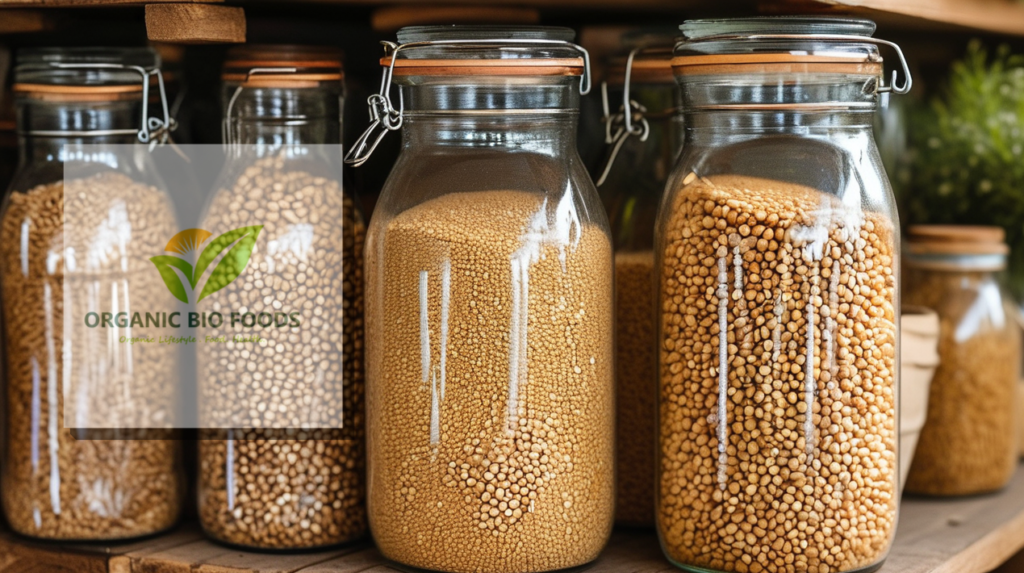One of the most important aspects related to farming is the storage of food and grain, which, if done properly, ensures freshness, nutrition, and freedom from infestation for a considerable period of time till consumption or sale. What organic farmers want is to protect their organic produce during storage. That means keeping those organic crops away from synthetic chemicals and preservatives that will affect the organic nature of these crops. Hence, organic farmers cling to natural methods of keeping their produce and grains safe. In this post we will cover organic methods of food and grain storage that will keep your harvest fresh and organic from the field to the dining table.
1. Hermetic Storage Containers
These are super airtight containers that keep out oxygen, which is really good to maintain the freshness of grains and seeds. They’re extremely useful for organic farmers since no chemicals would be involved in order to shoo away pests and other forms of spoilage.
Advantages of Hermetic Storage:
Pest Control: Exclusion of air- particularly oxygen-by these airtight containers prevents the growth of bugs and mold, the two major problems in stored grains. This method works beautifully without necessarily using any synthetic pesticide.
Keeps Nutrients Fresh: Storing grains and seeds in a sealed way helps keep their nutritional value intact by stopping oxidation, which can mess with vitamins and minerals over time.
Eco-friendly: As these containers can be reused, no nasty residues will remain in the soil; hence, it is very suitable for organic farmers.
Examples of Hermetic Storage:
GrainPro Bags
:
High-quality, reusable bags designed for storing grains in an airtight environment, protecting the grains against moisture and pests.
PICS Bags (Purdue Improved Crop Storage):

Another popular choice, PICS bags, are triple-layer plastic bags that provide excellent protection for stored grains without the use of chemicals.
Hermetic Storage tanks:


These are tanks made of plastic or aluminium that do not allow air to leak in or out. Once the containers are closed, the oxygen level decreases while carbon dioxide increases as a result of respiration of the grains, insects, fungi and other living forms within the container. When the oxygen level becomes sufficiently low, the insects stop feeding, become inactive, and eventually die
2. Natural Drying and Solar Dehydration
Drying is essentially required to prevent the decaying of food and grain. Organic farmers usually opt for natural techniques of drying, such as sun drying or solar dehydration, that decrease moisture without resorting to any artificial ingredient.
Advantages of Air Drying:
Cost-Effective: Sun drying and solar dehydration are two low-cost processes; they utilize natural resources and, therefore, can be afforded by farmers on any scale.
No Chemicals: These methods don’t require any chemical stuff, hence keeping the organic quality of the produce intact.
Long Shelf Life: The reduction of moisture content by natural means of drying assists in longer preservation of grains and other produce by preventing mold and bacterial growth.
How to Implement:
Sun Drying: Grains or produce are laid out in a very thin layer on a clean surface in the direct sun, with occasional turning to ensure even drying.
Solar Dehydrators:

A Means of Capturing and Concentrating Sunlight to Dry Produce More Effectively Compared to the Traditional Methods of Sun Drying. They are very effective in highly humid areas where open-air drying may not effectively take place.
3. Application of Diatomaceous Earth
Diatomaceous earth, or DE, is this natural substance derived from the fossilized remains of small water organisms called diatoms. It’s a super effective non-toxic option for organic farmers wanting to protect their stored grains from pests.
Benefits of Diatomaceous Earth
Natural Insecticide: DE works by absorbing the oils from the exoskeletons of bugs. It dries them out and ultimately kills them. Its pretty decent at killing off all manner of pests, such as weevils, beetles, and moths, without resorting to bad chemicals.
Food-grade DE is completely safe for storing grains, as you can just wash it off or process it before eating.
Eco-friendly: DE is naturally occurring, renewable, non-toxic, non-threatening to the environment, and it does not leave harmful residues.
How to Use:
Mixing with Grain: Lightly dust grain with food-grade DE before storage. The DE needs to be well dispersed for optimal efficacy.
Application to Storage Premises: It is also applied to the walls and floors of storage bins/silos to act as a protective barrier against the attack from pests.
4. Cool and Dry Storage Environments
Good storage conditions are very important in organic food and grain to keep them fresh. Generally, organic farmers pay much attention to keeping off temperature and humidity controls that may lead to spoilage or pests.
Advantages of Controlled Environments of Storage:
Prevents Mold and Bacteria: Keeping your storage spots cool and dry helps prevent mold and bacteria, since both of those love warmer, most humid places.
Slows Down Pest Activity: The majority of the pests are less active under cooler conditions, hence reducing the infestation.
Energy Efficiency: Farm-level cooling through natural ventilation, insulation, and shading will maintain cool storage without recourse to energy-intensive refrigeration systems.
Tips for how to keep your belongings cool and dry:
Ventilation: Storage facilities should be well-ventilated to prevent the accumulation of moisture and heat. Vents or fans can increase natural ventilation.
Insulation: Utilize natural materials in insulation such as straw bales or earthen walls to regulate storage areas and maintain temperatures.
Dehumidifiers: Very humid climates require the use of natural desiccants to absorb excess moisture, either silica gel or other clay-based products.
5. Biodegradable Storage Bags
Organic farmers will find much utility in biodegradable storage bags made from materials such as jute, cotton, or other plant fibers. They are also highly breathable to keep stored grains and other produce of better quality.
Why Biodegradable Storage Bags Are Awesome
Breathability: Organic fiber bags allow air to circulate, reducing the risk of moisture buildup and mold growth.
Sustainable: The bags are manufactured using renewable resources and degrade naturally, hence less impact on the environment. Chemical-free: So, unlike those synthetic bags, biodegradable storage bags don’t have those yucky chemicals that can interfere with your produce stored inside.
Examples of biodegradable storage bags include
Jute Bags:

Widely used for storing grains and pulses, jute bags are durable, breathable, and biodegradable.
Cotton Bags: Provide a very suitable alternative for smaller quantities of produce, being totally natural and chemical-free, which is in tune with organic farming principles.
.








